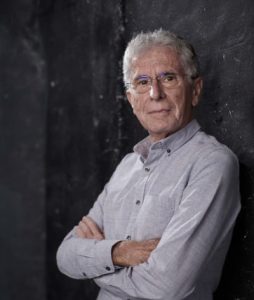
Christopher Laird
He is Managing Director, co-owner and co-founder of Banyan Ltd. He has produced more than three hundred documentaries, dramas and other video productions during his forty-year professional career.
He has been a teacher, published the arts journal, Kairi, and ran a theatre in Port of Spain during the 1970s. In 1973 the theatre was selected to take part in a course to stimulate local television production run by UNESCO, UWI and Trinidad and Tobago Television (TTT). After the workshop a series of production units was formed around the country. One group first met in the staffroom at Tranquillity Secondary, Port of Spain, where Savi Akal, another member of the workshop, taught. The group started working on a series of satirical cultural programmes, which would eventually be named Banyan: Art of the Tree, and ran from 1975-1977.
The group named itself Trinidad and Tobago Television (TTT) Workshop – “a bit like Sesame Street,” owing to its setting and emphasis on diversity. TTT handled the technical production. From that came the TTT workshop, which began a series called Banyan on TTT. This was so popular the theatre group became known as Banyan.
In 1976, under TTT chairman, Jimmy Bain, Banyan was banned along with journalists and TV personalities such as Wilbert Holder and Raoul Pantin. This did not affect the Family Planning Association seeing Banyan’s work and it commissioned the anglophone Caribbean’s first television soap opera, Who The C.A.P. Fits.
Banyan, then a workshop, was established with Paddington as the sole owner, before Laird joined him a few months later. Banyan Ltd was founded in 1981, with Laird, Paddington and playwright Tony Hall as its shareholders.
His career in film began with a film course while at university in the UK in the late 60s. That course worked in film (the video cassette had not yet been invented). His first opportunity to use video came in 1970 with the Sony Portapack ( a ½ inch black and white reel to reel machine) while working on his post graduate certificate of education. It was used in schools to record teachers in the classroom. In 1974 after a television programme making course run by UNESCO, UWI and TTT he started making programmes for transmission by TTT and by 1976, Banyan, established its own production facility using U-Matic ¾ inch cassettes.
He is responsible for establishing the Caribbean Film and Video Archive which is (arguably) the largest collection of Caribbean culture on video. In 2003, he founded, with Errol Fabien, the Region’s first all-Caribbean free-to-air television station, Gayelle. In 2009 he was awarded an honorary doctorate by the University of the West Indies.
Christopher has worked closely with Caribbean Tales for more than ten years, receiving the CaribbeanTales Lifetime Achievement Award in 2009.
Christoper Laird was inducted into the CBU Caribbean Media Hall Of Fame in 2025.
